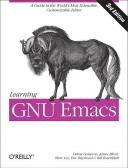Книга: Learning GNU Emacs, 3rd Edition
GNU Emacs and the Free Software Foundation
GNU Emacs and the Free Software Foundation
You don't need to know its history to use GNU Emacs, but its origins are an interesting part of computer history. The Free Software Foundation (FSF), which maintains and distributes GNU Emacs, has become an important part of computer culture.
A long time ago (1975) at MIT, Richard Stallman wrote the first Emacs editor. According to the folklore, the original Emacs editor was a set of macros for TECO, an almost incomprehensible and now obsolete line editor. The name Emacs stands for "Editing Macros." Tradition also has it that Emacs is a play on the name of a favorite ice cream store. Much has happened since 1975. TECO has slipped into deserved obscurity, and Emacs has been rewritten as an independent program. Several commercial versions of Emacs appeared, of which Unipress Emacs and CCA Emacs were the most important. For several years, these commercial implementations were the Emacs editors you were most likely to run across outside of the academic world.
Stallman's Emacs became prominent with the birth of the Free Software Foundation (FSF) and the GNU Project in 1984. GNU stands for "GNU's Not Unix" and refers to a complete Unix-like operating system (OS) that Stallman and his associates were building.
Stallman founded the FSF to guarantee that some software would always remain free. Note that Free does not necessarily mean cheap (you may have to pay a fee to cover the cost of distribution); it most definitely does mean liberated from restrictions about how it can be used and specifically how it can be shared.
Stallman is widely recognized as the founder of the free software movement, which was an important predecessor of the open source movement. Linux is now the most prominent example of open source software, and it falls under the GNU Public License or GPL (available online at http://www.gnu.org/copyleft/gpl.html). Stallman argues that much of Linux outside the kernel itself is GNU software and so he refers to it as GNU/Linux. All controversies aside, Stallman's contribution to the open source movement cannot be overestimated. GNU software and open source software distributed under the GPL are a mainstay for developers and computer users all over the world.
The FSF was created precisely to distribute programs under terms that encourage you to share, rather than hoard, software. The GPL is designed to prevent an unfortunately common practice—namely, a company taking public domain code, making a few modifications and bug fixes, and then copyrighting the modified version. Once a company does this, the program has essentially become private property and disappears from the public domain. Stallman formed the foundation because he finds this practice abhorrent. As he explains in the GNU Manifesto, "I cannot in good conscience sign a nondisclosure agreement or a software license agreement . . . So that I can continue to use computers without dishonor, I have decided to put together a sufficient body of free software so that I will be able to get along without any software that is not free." Elsewhere in the manifesto, Stallman calls sharing software the "fundamental act of friendship among programmers." Their software is free because it can be shared and will always be shareable—without restriction. FSF software is not under restrictive copyright laws, which Stallman objects to in principle. In fact, he coined the term copyleft to describe the FSF's sharable software base.[3]
Since GNU Emacs was first released, many other pieces of the GNU operating environment have fallen into place: C and C++ compilers (gcc and g++), a very powerful debugger (gdb), substitutes for lex and yacc (called flex and bison, respectively), a Unix shell (bash, which stands for "Bourne-Again Shell"), the Gimp (a graphics tool comparable to Adobe PhotoShop), GNOME (a desktop environment for Linux), and many other programs and libraries. Many important open source projects that originally used variants of the GPL or other licensing schemes have adopted the GPL as their license, including Python, Mozilla, and Zope. Author David Wheeler argues that all open source projects should release their software under a GPL-compatible license[4] (see http://www.dwheeler.com/essays/gpl-compatible.html for his views and some statistics about GPL'd software). With Linux, GNU tools, and other GPL'd software, it's possible to have a complete operating environment consistent with the values set forth by the FSF.
- Разработка приложений баз данных InterBase на Borland Delphi
- 4.4.4 The Dispatcher
- Open Source Insight and Discussion
- Introduction to Microprocessors and Microcontrollers
- About the author
- Chapter 6. Traversing of tables and chains
- Chapter 7. The state machine
- Chapter 8. Saving and restoring large rule-sets
- Chapter 11. Iptables targets and jumps
- Chapter 5 Installing and Configuring VirtualCenter 2.0
- Chapter 16. Commercial products based on Linux, iptables and netfilter
- Appendix A. Detailed explanations of special commands




